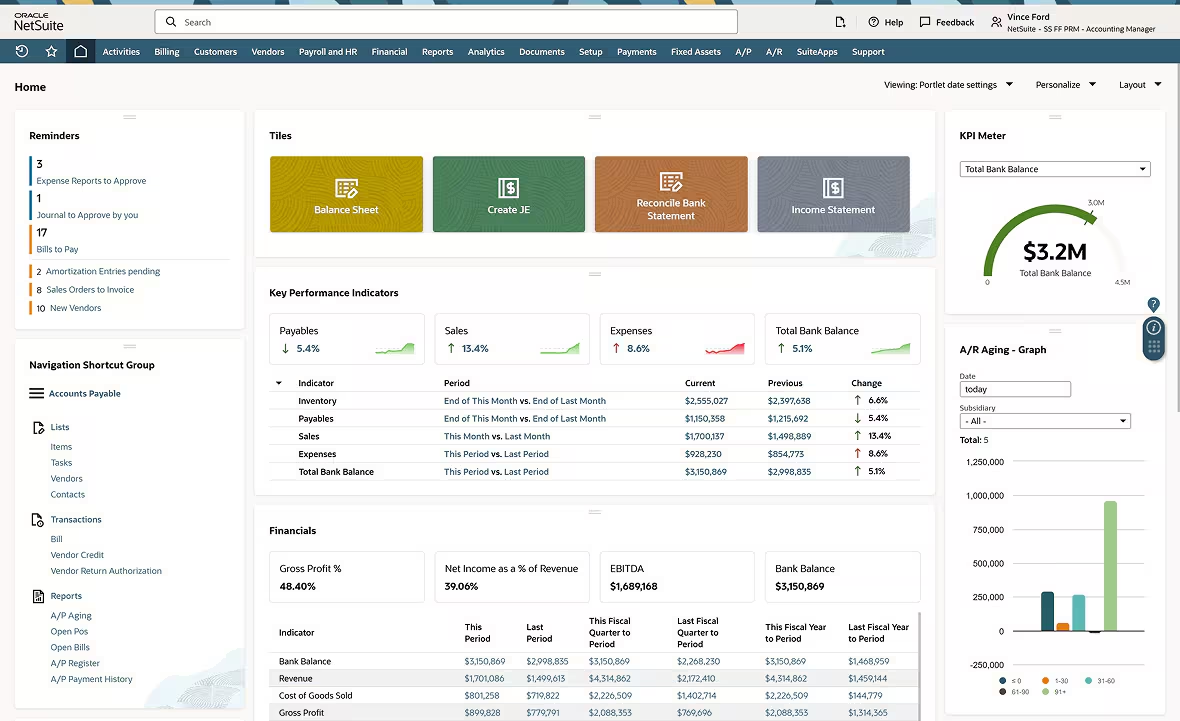Maximizing the Value of NetSuite Series
When it comes to getting the most out of your ERP system, reporting isn’t just a bonus feature—it’s the backbone of strategic decision-making. For many businesses, however, the power of NetSuite’s reporting tools remains underutilized. While dashboards and financial statements get plenty of attention, there are a range of pre-built and customizable reports in NetSuite that can unlock insights across departments.
This post, part of our Maximizing the Value of NetSuite series, highlights the essential NetSuite reports that every business—regardless of industry—should be using to drive smarter decisions, improve operational efficiency, and boost profitability.
Why Reporting Matters in an ERP
As discussed in our recent post NetSuite vs. Other ERPs: Why NetSuite Stands Out, one of the key reasons NetSuite excels as a cloud-based ERP is its real-time visibility. That visibility comes to life through the platform’s robust reporting engine.
With NetSuite, businesses can move beyond static spreadsheets and build dynamic reports that reflect live data, filtered by subsidiary, department, or location. The result is a centralized, real-time view of what’s happening in your business—financially and operationally.
1. Cash Flow Statement
No business can thrive without a firm handle on cash. NetSuite’s Cash Flow Statement helps you track the movement of cash in and out of your business, not just your profits on paper.
This report offers a snapshot of your operational health by breaking down inflows and outflows from operations, investing, and financing activities. It’s especially critical for businesses navigating growth, managing inventory cycles, or planning capital expenditures.
Want to improve your cash flow forecasting or automate payment schedules? Learn how NetSuite Optimization services from Foretopia can help.
2. Sales by Item / Product Reports
Whether you’re in wholesale distribution, retail, or manufacturing, your sales data tells a story. NetSuite’s Sales by Item report shows which products are driving revenue, which ones are lagging, and how performance trends vary over time.
Segment this data by customer segment, channel, or location, and you’ll discover insights that can guide pricing decisions, promotional strategies, or inventory rebalancing.
This is a must-use for companies leveraging NetSuite for Wholesale & Distribution or NetSuite for Retail.
3. Budget vs. Actual Report
One of the most underused NetSuite reports, Budget vs. Actual, compares what you planned to spend or earn with what actually happened. It’s particularly useful for CFOs and department heads managing multiple budgets across teams or projects.
This report is more than a checkup—it’s a tool for accountability. Use it to assess whether marketing is spending wisely, if cost of goods sold is staying in line, or if your actuals are signaling it’s time to adjust expectations.
If your team struggles with data hygiene or report alignment, our NetSuite Training programs can help standardize reporting across your organization.
4. Inventory Turnover Report
If you hold inventory, one of your most important KPIs is how often it turns. The Inventory Turnover Report in NetSuite measures how quickly you’re selling and replenishing stock. A low turnover might indicate overstocking or poor demand, while a high turnover could mean strong sales—or stockouts.
NetSuite’s built-in inventory reports allow you to analyze turnover by item, category, or location, helping you fine-tune your purchasing and stocking strategies.
This report is essential for companies using NetSuite for Manufacturing, especially those managing multiple warehouses or seasonal products.
5. Employee Utilization & Time Tracking Reports
For professional services firms and internal project-based teams, tracking time and resource use is key to profitability. NetSuite’s Employee Utilization Report helps monitor billable vs. non-billable hours and project time allocation by employee.
This data can highlight overworked teams, underused resources, or misalignment between time tracking and project budgets. It’s a direct line to understanding where your service revenue is being made—or lost.
Foretopia’s NetSuite Customization services can help tailor these reports to your firm’s unique billing model and KPIs.
6. Customer Aging Report
Tracking who owes you—and how long they’ve owed it—is vital for maintaining healthy cash flow. The Customer Aging Report segments receivables into age brackets (e.g., 0–30, 31–60, 61–90+ days) so you can stay ahead of delinquencies.
This report is especially powerful when tied to saved searches that automatically alert your collections team when balances cross thresholds, improving recovery time and reducing risk.
If you’re behind on AR collections (who isn’t?) or not sure how to automate these processes, our NetSuite Support & Managed Services can help.
7. Lead Source ROI Report
Marketing teams often struggle to tie campaigns to actual revenue. NetSuite’s Lead Source ROI Report helps close that gap by tying closed opportunities to their originating source—email, social, referrals, etc.
With this insight, you can shift spend toward channels that convert, refine your messaging, or adjust your lead scoring model.
Companies that implement strong NetSuite Integrations with marketing tools (like HubSpot or Google Ads) can make this report even more powerful.
8. Revenue Recognition Forecast
For subscription-based businesses or companies managing contracts and retainers, revenue recognition isn’t just an accounting issue—it’s a compliance one. NetSuite’s Revenue Recognition Forecast Report gives CFOs a clear view of expected recognized revenue over time, ensuring compliance with ASC 606 and helping predict revenue health.
This is a good one for companies using NetSuite for Technology or SaaS businesses managing recurring billing.
Start With What Matters Most
You don’t need to use every NetSuite report available—but identifying the 4–5 most relevant to your business model and growth goals can drive meaningful improvements.
From finance to operations to marketing, NetSuite’s reporting tools are built to eliminate guesswork. And with a knowledgeable partner like Foretopia, you can go beyond out-of-the-box dashboards and build a reporting framework that empowers every level of your organization.
If you’re not sure where to start or how to tailor reports to your needs, schedule a free consultation with our team today.
Coming Next in the Series:
Stay tuned for the next post in our Maximizing the Value of NetSuite series, where we’ll explore SuiteFlow automations that eliminate repetitive tasks and improve process compliance.



